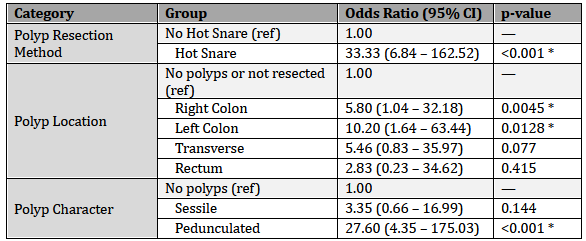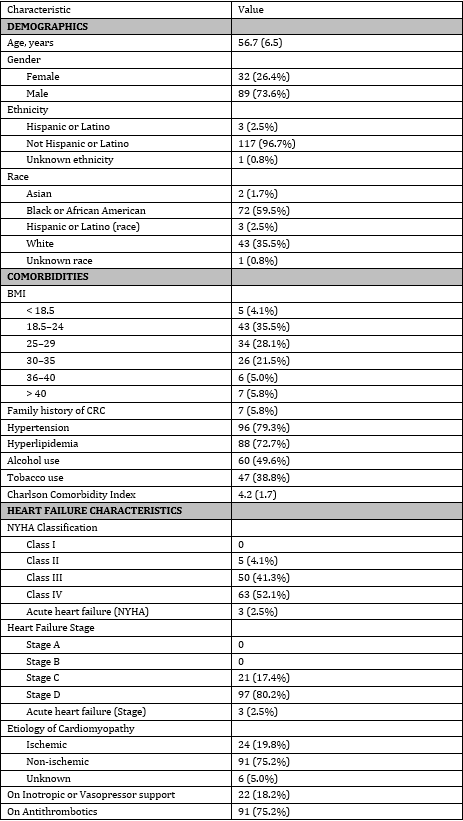Monday Poster Session
Category: General Endoscopy
P2982 - Evaluating the Efficacy, Safety, and Diagnostic Yield of Inpatient Screening Colonoscopies in Heart Failure Patients Undergoing Evaluation for Advanced Cardiac Therapies
Monday, October 27, 2025
10:30 AM - 4:00 PM PDT
Location: Exhibit Hall

Katherine Sorrentino, MD (she/her/hers)
Emory University School of Medicine
Atlanta, GA
Presenting Author(s)
Katherine Sorrentino, MD1, Smit Deliwala, MD1, Heba Iskandar, MD1, Douglas G. Adler, MD, FACG2, Saurabh Chawla, MD, FACG1, Anand Jain, MD1
1Emory University School of Medicine, Atlanta, GA; 2Center for Advanced Therapeutic (CATE), Centura Health, Porter Adventist Hospital, Peak Gastroenterology, Denver, CO
Introduction: Colonoscopy is routinely performed for patients undergoing evaluation for heart transplant or placement of left ventricular assist devices (LVAD) to identify colorectal cancer (CRC) or advanced colonic lesions. However, most existing studies exclude hospitalized patients with cardiogenic shock, limiting generalizability to the highest-risk population. We aimed to evaluate the safety, feasibility, and diagnostic yield of colonoscopy in this ultra-high-risk cohort.
Methods: We conducted a retrospective review of inpatients undergoing colonoscopy for advanced therapy evaluation at a tertiary referral center between January 2020 and October 2024. Included patients had advanced heart failure with symptoms refractory to optimal medical therapy. Data collected included demographic, cardiac status, procedural characteristics, and outcomes. The primary outcome was technical success. Secondary outcomes included complication rates, diagnostic yield, and predictors of adverse events. Logistic regression was used to assess relationships between complications and procedural or clinical variables.
Results: A total of 121 patients (mean age 57 ± 7 years; 74% male) were included. The cohort was racially diverse, and most patients were NYHA Class III or IV with 75.2% having non-ischemic cardiomyopathy. Technical success was high (97.5%), and 79.3% had adequate bowel preparation.
The adenoma detection rate was 47.1%. No malignancies were identified. Polyp morphology of resected polyps included sessile (83.3%), semi-pedunculated (4.5%), and pedunculated (12.1%); sizes of identified polyps were predominantly < 10 mm (84.2%). Hot snare polypectomy was performed in 12.4% of cases, with a third of hot snare cases requiring placement of hemostatic clips. Immediate and delayed bleeding rates were 3.3% and 6.6%, respectively. No perforations or infections occurred. 8.3% of patients underwent repeat colonoscopies during hospitalization due to inadequate prep (2.4%) or post-procedural bleeding (5.9%).
In comparing patients with and without complications, no significant differences were observed in demographics, comorbidities, HF severity, bowel prep, anticoagulation use, or hemodynamic support. Full results of logistic regression are shown in Table 2.
Discussion: Colonoscopy in admitted patients with advanced decompensated heart failure—including those on inotropic and mechanical support—is technically feasible, generally safe, and offers high diagnostic yield with a low rate of complications.

Figure: Table 1. Baseline patient characteristics (n=121)
Values are presented as mean (SD) or n(%).

Figure: Table 2. Multivariate logistic regression of technical factors associated with colonoscopy complications
Adjusted analysis excluding patients without polyps or with un-resected polyps.
Disclosures:
Katherine Sorrentino indicated no relevant financial relationships.
Smit Deliwala indicated no relevant financial relationships.
Heba Iskandar indicated no relevant financial relationships.
Douglas Adler: Boston Scientific – Consultant.
Saurabh Chawla indicated no relevant financial relationships.
Anand Jain indicated no relevant financial relationships.
Katherine Sorrentino, MD1, Smit Deliwala, MD1, Heba Iskandar, MD1, Douglas G. Adler, MD, FACG2, Saurabh Chawla, MD, FACG1, Anand Jain, MD1. P2982 - Evaluating the Efficacy, Safety, and Diagnostic Yield of Inpatient Screening Colonoscopies in Heart Failure Patients Undergoing Evaluation for Advanced Cardiac Therapies, ACG 2025 Annual Scientific Meeting Abstracts. Phoenix, AZ: American College of Gastroenterology.
1Emory University School of Medicine, Atlanta, GA; 2Center for Advanced Therapeutic (CATE), Centura Health, Porter Adventist Hospital, Peak Gastroenterology, Denver, CO
Introduction: Colonoscopy is routinely performed for patients undergoing evaluation for heart transplant or placement of left ventricular assist devices (LVAD) to identify colorectal cancer (CRC) or advanced colonic lesions. However, most existing studies exclude hospitalized patients with cardiogenic shock, limiting generalizability to the highest-risk population. We aimed to evaluate the safety, feasibility, and diagnostic yield of colonoscopy in this ultra-high-risk cohort.
Methods: We conducted a retrospective review of inpatients undergoing colonoscopy for advanced therapy evaluation at a tertiary referral center between January 2020 and October 2024. Included patients had advanced heart failure with symptoms refractory to optimal medical therapy. Data collected included demographic, cardiac status, procedural characteristics, and outcomes. The primary outcome was technical success. Secondary outcomes included complication rates, diagnostic yield, and predictors of adverse events. Logistic regression was used to assess relationships between complications and procedural or clinical variables.
Results: A total of 121 patients (mean age 57 ± 7 years; 74% male) were included. The cohort was racially diverse, and most patients were NYHA Class III or IV with 75.2% having non-ischemic cardiomyopathy. Technical success was high (97.5%), and 79.3% had adequate bowel preparation.
The adenoma detection rate was 47.1%. No malignancies were identified. Polyp morphology of resected polyps included sessile (83.3%), semi-pedunculated (4.5%), and pedunculated (12.1%); sizes of identified polyps were predominantly < 10 mm (84.2%). Hot snare polypectomy was performed in 12.4% of cases, with a third of hot snare cases requiring placement of hemostatic clips. Immediate and delayed bleeding rates were 3.3% and 6.6%, respectively. No perforations or infections occurred. 8.3% of patients underwent repeat colonoscopies during hospitalization due to inadequate prep (2.4%) or post-procedural bleeding (5.9%).
In comparing patients with and without complications, no significant differences were observed in demographics, comorbidities, HF severity, bowel prep, anticoagulation use, or hemodynamic support. Full results of logistic regression are shown in Table 2.
Discussion: Colonoscopy in admitted patients with advanced decompensated heart failure—including those on inotropic and mechanical support—is technically feasible, generally safe, and offers high diagnostic yield with a low rate of complications.

Figure: Table 1. Baseline patient characteristics (n=121)
Values are presented as mean (SD) or n(%).

Figure: Table 2. Multivariate logistic regression of technical factors associated with colonoscopy complications
Adjusted analysis excluding patients without polyps or with un-resected polyps.
Disclosures:
Katherine Sorrentino indicated no relevant financial relationships.
Smit Deliwala indicated no relevant financial relationships.
Heba Iskandar indicated no relevant financial relationships.
Douglas Adler: Boston Scientific – Consultant.
Saurabh Chawla indicated no relevant financial relationships.
Anand Jain indicated no relevant financial relationships.
Katherine Sorrentino, MD1, Smit Deliwala, MD1, Heba Iskandar, MD1, Douglas G. Adler, MD, FACG2, Saurabh Chawla, MD, FACG1, Anand Jain, MD1. P2982 - Evaluating the Efficacy, Safety, and Diagnostic Yield of Inpatient Screening Colonoscopies in Heart Failure Patients Undergoing Evaluation for Advanced Cardiac Therapies, ACG 2025 Annual Scientific Meeting Abstracts. Phoenix, AZ: American College of Gastroenterology.

